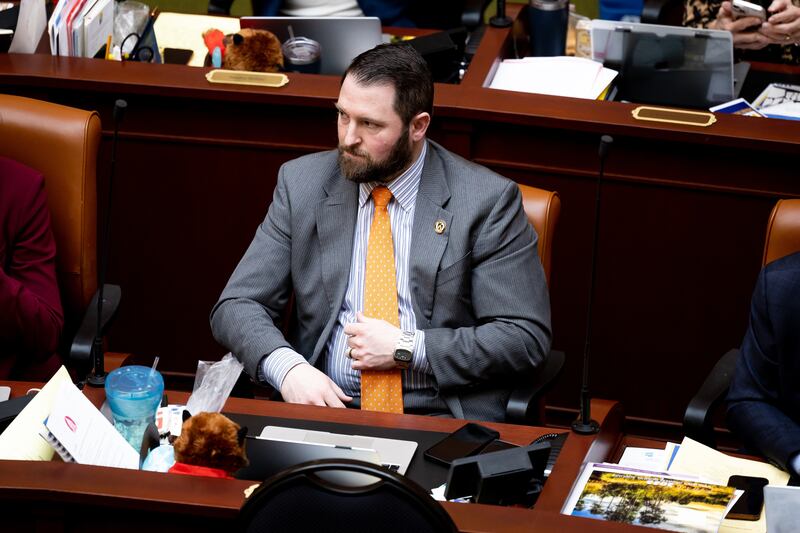With the possibility of another Olympics coming to Utah, lawmakers should make it clear there can’t be another scandal like the one that surrounded Salt Lake City’s successful bid for the 2002 Winter Games, says Rep. Brett Garner, D-West Valley.
So Garner has come up with HB560, which would prohibit tax dollars from being used for lavish gifts, campaign donations, personal expenses or any other purpose that’s not related to hosting either the 2030 or 2034 Winter Games.
The state would be able to demand “an itemized accounting” of any public monies spent on the bid or the organization of a Winter Games, and bring a civil action to recoup tax dollars deemed to have been misspent.
Also, the bill would require those prohibitions to be part of the contract Gov. Spencer Cox is set to sign on behalf of the state should the International Olympic Committee select Salt Lake City to host again, a decision likely to be made some time next year.
Bidders have stressed that no state or local tax dollars are needed for either the effort to land another Winter Games or the proposed $2.2 billion budget for hosting again that’s anticipated to increase due to inflation.
But Garner told the Deseret News the Utah Legislature “opened the door” to potential public spending by unanimously passing legislation intended to assure the IOC the state accepts financial responsibility for an Olympics should other revenue sources fall short.
The recently appointed state lawmaker acknowledged, however, that his bill introduced Thursday has little chance of even being heard in the Republican-dominated Legislature before the 2023 session ends next week.
“My main goal in starting the discussion was to basically say we had a scandal in 2002 and we’re not going to repeat the mistakes that we made,” Garner said, referring to the international bribery scandal that rocked the Olympics in the late 1990s.
Revelations that Salt Lake City tried to bribe IOC members with cash, gifts and scholarships sparked multiple investigations around the world, including a U.S. criminal case that ended in acquittal, as well as changes in the bid process and the Salt Lake Organizing Committee.
Utah Sen. Mitt Romney was brought in to run the 2002 Winter Games and he named Fraser Bullock as chief operating officer. Bullock is the president and CEO of the Salt Lake City-Utah Committee for the Games that’s behind the bid.
Garner said his bill “is not to say anything is wrong right now, but unfortunately, we have seen since 2002 there’ve been corruption scandals” involving other Olympics, including the 2020 Summer Games in Tokyo held a year later because of the COVID-19 pandemic.
The Japanese bribery scandal has already resulted in multiple indictments and has hurt public support for Sapporo’s 2030 Winter Games bid to the point that it’s been put on hold. Vancouver, Canada, is the other city in the race, although new bids may be coming.
“I feel like we should make some steps to say that we’re going to be better, that we’re going to do this honorably, and that we’re going to learn from our mistakes,” Garner said, especially since the state is now a financial backstop.
“That’s a worst-case scenario, I know,” he said.
Garner raised some questions during last week’s House floor debate on the Olympic legislation sponsored by Rep. Jon Hawkins, R-Pleasant Grove, HB430 and HCR8, which has both been signed by the governor.
“Unfortunately, we did have some bad memories come up in 2002,” Garner said, asking what would be done “to ensure that public funding is being used transparently and without semblance of corruption.”
Hawkins said transparency is “exactly the reason” his bill creates a new legislative committee to oversee the private bid and organization efforts, “to work with them on anything related to the Games and their needs” from the Legislature.
Garner responded by saying he believes another Olympics would benefit the state, adding, “we can do much better in a future bid if we can hold ourselves to a higher standard than other hosts have and by doing it the ‘Utah way.’”
Friday, Garner said he’ll have to see if there’s “political will to see what we can do to protect taxpayer dollars. If the committee that has been set up in the bill that passed is enough, I’m fine with that.”
What’s important to him, he said, is establishing “some guardrails” to ensure that if public money turns out to be needed for another Winter Games, it isn’t misused. “We need to be very clear on specific things that have tripped us up in the past.”


